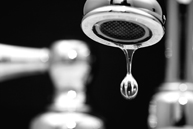Down the drain: Dealing with Montreal's water wastage
Down the drain: Dealing with Montreal's water wastage McGill University
User Tools (skip):
Down the drain: Dealing with Montreal's water wastage
When you shower, brush your teeth or flush the toilet, do you ever think about how much these water-consuming activities could cost? The average Montrealer consumes over 5,000 cups of water each day and often never pays a cent. In Montreal, few homes are metered, while the rest are charged well below an appropriate rate. Professor George McCourt in the McGill School of Environment believes that if we don't pay for the water we use, we will consume more than we need. This could lead to water shortages. McCourt, in collaboration with the City of Montreal, examines the factors that influence water consumption in Montreal so that the city can create an effective water policy.

ISTOCKPHOTO.COM
Although Canada contains one-fifth of the world's freshwater supply, much of it is inaccessible. Most of our water flows north, away from large cities. "Where the water is flowing and where the people are don't match," says McCourt. To make things worse, we deplete our freshwater resources faster than they are replenished. Pollution of existing water supplies and reduced rainfall resulting in drought conditions also shrink our water sources. Since 1994, three-fourths of all municipalities have experienced a water shortage, and this number will grow.
Compared to the rest of the country, notes McCourt, Montreal's water consumption stands out like a sore thumb. Students involved with McCourt's environmental research course found that in 1999, Montreal had the highest water use per capita at 1,287 litres a day. This means that Montrealers use more than double the amount of water than residents of most other Canadian cities.
To be fair, 40 percent of Montreal's water is wasted because of old leaky pipes. The city wants to repair the pipes, but this will take time and money. Another solution is to meter the water that people use. According to McCourt's research group, water metering reduces water consumption. The problem is that to install meters throughout Montreal would be costly. That's where Environmental Research 401 comes in.
This group has created a database compiled from meter information supplied by the city. The database wil be used to determine which factors, such as house size, yard size, property value and owner's income, influence water consumption. McCourt's group found that the size of the home and the value of the property are two potential key factors that could be associated with increased water consumption.
The city can use this data to develop an equitable taxation system that accurately reflects residential water consumption. Funds from the tax could go toward fixing the leaky pipes. Before any tax is implemented, the city and McCourt's research group will look at other cities to see how they tax water use. The group also hopes to find out from Montrealers what appliances they use and how often they shower, water their lawns and wash their cars. "This information will help us target the appropriate areas for conservation and help us understand why some households tend to use more water than others," explains student researcher Daphne Ferguson. The City of Montreal and McGill's School of the Environment can then work toward helping Montrealers to use water more wisely — and possibly help prevent future water shortage.
WARM-SPARK (Writing About Research at McGill-Students Promoting Awareness of Research Knowledge) is a program sponsored by the Faculty of Science, the Offices of the Vice-Principal (Research) and University Relations, NSERC, the Faculty of Engineering and the Faculty of Agriculture and Environmental Sciences. See www.spark.mcgill.ca for more information.
